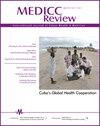Cuba's National Regulatory Authority & COVID-19: Olga Lidia Jacobo-Casanueva MS Director, Center for State Control of Medicines and Medical Devices (CECMED).
IF 1.8
4区 医学
Q3 PUBLIC, ENVIRONMENTAL & OCCUPATIONAL HEALTH
引用次数: 13
Abstract
At the time of this writing, more than 10 million Cubans (nearly 90% of the country's population), had received at least their first dose of Soberana 02 or Abdala, two of five vaccine candidates for SARS-CoV-2 developed and produced on the island. Late-phase clinical trial data revealed that Abdala is 92.28% effective after the full, three-dose cycle and Soberana 02 is 91.2% effective after two doses, when followed by a booster of Soberana Plus.[1] Cuban health authorities have committed to vaccinating the entire population, including children aged 3-18 years old, using these vaccines by the end of 2021. The first pre-clinical, peer-reviewed data are available,[2] with clinical trial results already submitted to various international journals. Building on decades of biotechnology know-how developing, producing and administering 11 preventive vaccines for childhood diseases-used in the nation's universal health system and also marketed elsewhere-Cuba is the first, and to date only, country in Latin America and the Caribbean to develop its own vaccine candidates for COVID-19 (Soberana 01; Soberana 02; Soberana Plus; Abdala and Mambisa; see Box on following page). In a strategy designed to ensure comprehensive and importantly, independent solutions to the global health crisis, research institutes and manufacturing facilities coordinated by BioCubaFarma-the country's biopharmaceutical conglomerate-have also developed COVID-19 treatments and essential medical equipment. To gain a better understanding of the regulatory process involved, MEDICC Review turned to Olga Lidia Jacobo-Casanueva, Director of the Center for State Control of Medicines and Medical Devices (CECMED), Cuba's national regulatory authority (NRA). A clinical microbiologist, Jacobo-Casanueva served as interim director throughout 2020 before becoming director in January 2021. She has spent nearly her entire career at CECMED, working her way up the ranks in a unique trajectory: from her first position in 1992 in the Center's microbiology laboratories, she has since worked in all but one of the six areas required by WHO to qualify as a National Regulatory Authority of Reference (NRAr; CECMED was certified as a Level 4 NRAr in 2011, a qualification it maintains). In short, Jacobo-Casanueva is a regulatory polymath, with hands-on experience in nearly every facet of regulation. She is also an adjunct researcher in the Faculty of Biology at the University of Havana. Cuba's decision to confront the pandemic autonomously by developing preventive vaccines to control COVID-19 is deliberate and fraught with challenges. With dozens of ongoing clinical trials, coupled with the declining epidemiological and economic situation in Cuba-exacerbated by tightened US sanctions affecting all facets of COVID-19 prevention and response-we appreciate the time Jacobo-Casanueva took from her schedule to parse the complex regulatory mechanisms required to introduce Cuban and imported products into the national health system. Editor's note: Just days after this interview was conducted in Havana, CECMED granted Emergency Use Authorization for Abdala, one of five Cuban COVID-19 vaccine candidates undergoing clinical trials since 2020.古巴国家监管机构与COVID-19: Olga Lidia Jacobo-Casanueva MS国家药品和医疗器械控制中心(CECMED)主任。
在撰写本文时,超过1000万古巴人(几乎占该国人口的90%)至少接种了第一剂Soberana 02或Abdala,这是岛上开发和生产的五种SARS-CoV-2候选疫苗中的两种。后期临床试验数据显示,Abdala在完整的三剂量周期后的有效性为92.28%,而Soberana 02在两剂量后的有效性为91.2%,随后是Soberana Plus的加强剂。[1]古巴卫生当局已承诺在2021年底前使用这些疫苗为包括3-18岁儿童在内的全体人口接种疫苗。第一批临床前、同行评议的数据是可用的[2],临床试验结果已经提交给各种国际期刊。古巴在开发、生产和管理儿童疾病预防性疫苗方面积累了数十年的生物技术知识,这些疫苗用于该国的全民卫生系统,也在其他地方销售。古巴是拉丁美洲和加勒比地区第一个,也是迄今为止唯一一个开发自己的COVID-19候选疫苗的国家(Soberana 2001;Soberana 02;Soberana +;Abdala和Mambisa;见下一页方框)。在一项旨在确保全面且重要的独立解决全球卫生危机的战略中,由该国生物制药集团biocubafarma协调的研究机构和制造设施也开发了COVID-19治疗方法和基本医疗设备。为了更好地了解所涉及的监管过程,《医学评论》咨询了古巴国家监管机构药品和医疗器械国家控制中心(CECMED)主任Olga Lidia Jacobo-Casanueva。jacob - casanueva是一名临床微生物学家,在2021年1月成为董事之前,他在2020年期间担任临时董事。她的几乎整个职业生涯都在CECMED度过,并以独特的轨迹不断晋升:从1992年在该中心微生物实验室的第一个职位开始,她一直在世卫组织要求的六个领域中工作,但没有一个领域符合国家参考监管机构的资格;2011年,CECMED被认证为4级NRAr,并保持该资格)。简而言之,雅各布-卡萨努瓦是一位监管通才,几乎在监管的各个方面都有实践经验。她也是哈瓦那大学生物学院的兼职研究员。古巴决定自主应对大流行,开发预防疫苗以控制COVID-19,这是经过深思熟虑的,充满了挑战。鉴于数十项正在进行的临床试验,再加上古巴流行病学和经济形势的恶化——美国加强制裁影响了COVID-19预防和应对的各个方面——我们感谢雅各布-卡萨努瓦从她的日程中抽出时间来分析将古巴和进口产品引入国家卫生系统所需的复杂监管机制。编者注:这次采访在哈瓦那进行几天后,CECMED批准了Abdala的紧急使用授权,Abdala是自2020年以来正在进行临床试验的五种古巴COVID-19候选疫苗之一。
本文章由计算机程序翻译,如有差异,请以英文原文为准。
求助全文
约1分钟内获得全文
求助全文
来源期刊

Medicc Review
PUBLIC, ENVIRONMENTAL & OCCUPATIONAL HEALTH-
CiteScore
3.30
自引率
9.50%
发文量
49
审稿时长
>12 weeks
期刊介绍:
Uphold the highest standards of ethics and excellence, publishing open-access articles in English relevant to global health equity that offer the best of medical, population health and social sciences research and perspectives by Cuban and other developing-country professionals.
 求助内容:
求助内容: 应助结果提醒方式:
应助结果提醒方式:


